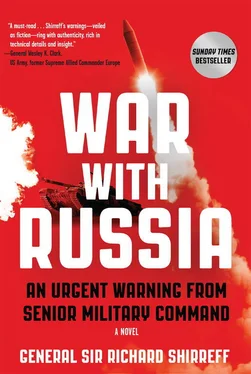On top of this, to be conducting a demonstration amphibious landing when the Royal Navy was at war with Russia—because that is what he understood by Britain signing up to Article 5—offended Bush’s common sense. Close with the enemy in the finest Nelsonian traditions by all means, or stay well back and out of trouble until you are ready to take the fight to them. But do not “poise” and present a target for no clear strategic gain.
On the flight deck below, Bush watched the organized chaos as men, guns and equipment of the Commando Artillery Regiment and the Commando engineers cross-decked to the amphibious ship in order to take part in the landing. Brightly colored figures, jackets colored and coded according to their role on the flight deck, controlled and guided Merlin troop carriers as other long lines of commandos in full battle gear, laden with bergens, body armor and all the paraphernalia of war, stood patiently on the elevators, waiting to be called forward to board them. Larger, twin-rotored Chinooks hovered low as they picked up guns and Viking lightly armored tracked vehicles and transported them forward to the beaches. Film crews filmed it all and, to the watching world, this was a magnificent projection of Royal Navy sea power by the pride of its battle fleet.
Clad in white flash hood and gloves, he stepped into the darkened calm of the Ops Room, the nerve center of the ship. It was here that the ship’s radars and the weapons systems that protected the ship were operated from; kept separate from the flight operations, which were conducted from the control tower, as on any airfield. As Bush’s eyes adjusted to the low light, he saw banks of computers manned by masked operators, on whom the blue light from radar screens and other monitors cast an eerie glow.
In the center of the Ops Room stood the tall figure of Commodore Tony Narborough, the ship’s captain, flanked by his Principal Weapons Officer, the conductor of the complex orchestra that defended the ship.
“Hello, Number One. We’ve got a bit of a flap on,” said Narborough, trying to appear calm. “ Daring has just signaled that she’s picked up a sonar trace. Possibly a Kilo.”
“Any indication of the direction she’s heading in, Sir?” asked Bush, his voice muffled by the flash hood everyone wore when at “action stations” to reduce the risk of the catastrophic burns that, after drowning, were the greatest risk in warships.
“Looks like she’s heading in the general direction of the Amphib group, to our south,” replied Narborough. “ Lancaster and Dauntless are covering the Amphib group with an active sonar search, while Daring is covering us to the north.”
“Shouldn’t we delay the landing until we’ve dealt with the sub threat?” suggested Bush.
“Fair point, Number One, but the Admiral’s made it clear that the landing exercise goes on. The world is watching and filming and we don’t want them to see us turn and run at the first bit of bother. Anyway, the Int boys fully expected the Russians to test our defenses, but no one thinks they are going to actually attack. That said, we’ll assume they might, so we’ve got to be ready for anything. Trouble is, we’ve yet to get clearance to move from passive to active ROEs—our Rules of Engagement—so, until they change, all we can do right now is monitor, track and observe… Unless, of course, we need to apply self-defense.”
While Bush could admire Narborough as a highly competent sea captain, he also knew that he was not a man inclined to question the decision of his immediate superior, lest it impact on his career. That meant, in effect, that while a ship could always move from passive ROE to active in the event of an attack, it would in fact be too late. Once missiles, bombs or torpedoes were heading in their direction, the ROE state was entirely academic. As far as Bush was concerned, given that a Royal Navy ship had already been sunk by the Russians, if any enemy vessel or aircraft came within striking range, then it should be deemed a legitimate target and engaged. And if the situation was so fraught that London deemed it too provocative to go to active ROE, then what on earth were they doing at the entrance of the Russians’ backyard in the first place?
This, though, was not a sentiment that would endear him to his Captain were he to share it in public. “Then shouldn’t we close up with the amphibs?” Bush asked instead.
“That way we’re presenting a nice, neat package for the Russian sub captain. No, Number One, we’re staying dispersed. Besides, we’re safer in the open sea, as the proximity of land and shallower water would constrain us and prevent us maneuvering.” Behind his flash hood, Narborough’s voice was sharp, almost petulant.
Bush knew that detection of submarines in shallow water was especially difficult. Moreover, the changing temperature and salinity layers at different depths made detection in the Baltic even more challenging, which meant the submarine had the advantage over them. Narborough knew that every bit as well as he did, so this was not a discussion worth prolonging.
Then the voice of the Principal Warfare Officer rang out urgently in the muted Ops Room: “ Daring reports possible Kilo Class sub at longitude 54 degrees, 25 minutes, 23.898 seconds north; latitude 14 degrees, 24 minutes, 35.280 seconds East. Contact is bearing 26.75 degrees, distance 10.234 nautical miles.”
“Find out what she’s doing about it,” ordered Narborough.
“I’ve just spoken to her. She’s got her Merlin anti-submarine helicopter up, sonar is active and she’s searching for it.”
Bush thought quickly. The submerged speed of a Kilo Class was 17 knots. The range of her UGST wake-homing torpedoes, with their 200 kilogram explosive charge, was 22 nautical miles. So the Kilo was already in a position to launch a torpedo at Queen Elizabeth . However, if the Russian sub captain was any good, and he would be good, he’d want to get eyes on his target before launching a torpedo; probably within 10,000 yards, or five nautical miles. That meant Queen Elizabeth could expect an attack in about thirty-five minutes, if that was the Russian’s intent.
How the hell did the sub manage to creep up so close without being spotted? The alarm bells might be sounding in Bush’s head, but the answer was blindingly obvious: We’ve handed ourselves to him on a plate by not having enough anti-sub escorts!
He looked at Narborough. In the narrow gap in his white flash mask between nose and forehead, Bush saw a moment of fear in the Captain’s pale blue eyes. And then it was gone.
Grabbing a microphone, the Captain spoke urgently to the bridge. “Officer of the watch, order damage control state One, condition Zulu. Helmsman, commence zigzagging at maximum speed. That’ll make it more difficult for him to stay with us. Then slow down at random—down to five knots, which will make it more difficult for him to hear us. Get a Merlin with sonar buoy airborne between us and the sub. Now… Number One, I’m staying here to fight the ship. I want you on the bridge.”
“Aye, aye, Sir.” Bush saluted briefly and left the Ops Room at speed.
0935 hours, Saturday, May 27, 2017
Control Room, Kilo Class submarine Krasnokamensk , Baltic Sea
CAPTAIN OF THE Second Rank, Alexander Ivanovich Chernavin of the Russian Navy stood in the cramped, darkened control room of Kilo Class submarine Krasnokamensk . To his left, in the confined space, faces illuminated by their plasma screens, was the Ship Control Panel manned by the planesmen, who steered, submerged and surfaced the boat under the close supervision of the Diving Officer of the Watch. Behind them stood the Chief of the Watch. On his right were the sonar operators, who were operating both active and passive sonar. They were keeping a close track of the contact they were following from the sound of its propellers and the noise of its hull as it moved through the water. Beside him stood the Executive Officer, his second in command.
Читать дальше












